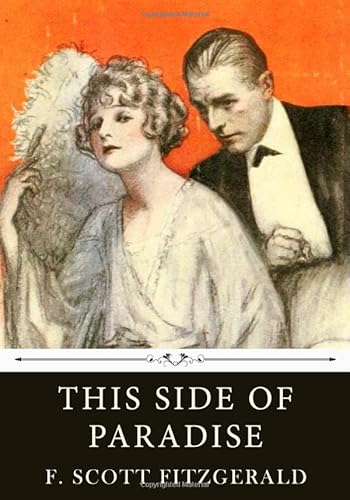Welcome, fellow book adventurers, to this delightful review of This Side of Paradise! Join me as we explore Amory Blaine’s journey through the tumultuous world of growing up. In a book that made me chuckle and ponder, F. Scott Fitzgerald doesn’t hold back as he dives into the trials of college life, the quest for identity, and the rebellion against societal norms. Stay tuned for a wild ride through this literary classic!
In a nutshell
‘This Side of Paradise’ is a classic novel by F. Scott Fitzgerald, full of intrigue and youthful vigor. This tale falls under the genre of a coming-of-age story, sprinkled with romance and a touch of that Jazz Age charm.
The book follows Amory Blaine, a young lad who’s trying to find his place in the world. Journey with him through college life, love affairs, and the never-ending quest for identity. Fitzgerald’s themes include self-discovery, societal expectations, and the clash between ambition and reality. It’s a timeless read that captures the spirit of the early 20th century, while also giving a nudge and a wink at modern-day struggles.
Exploring Coming of Age Themes in Literature
Coming of age themes have always intrigued me. I remember when I was a teenager and thought I knew everything – those were the days! It’s interesting how authors capture this transformative phase of life. In F. Scott Fitzgerald’s ‘This Side of Paradise,’ we follow Amory Blaine on his rollercoaster journey to adulthood. The book explores themes like identity, love, and self-discovery, which are as relevant today as they were in 1920.
Amory is a complex character who goes from a self-centered youth to a person seeking meaning in life. I found myself cheering for him, despite his flaws. Fitzgerald masterfully portrays the confusion and angst of young adulthood. This reminds me of my high school years when I couldn’t decide if I wanted to be a rockstar or a scientist. Turns out, I’m neither! I think that’s the magic of coming of age stories – they hold up a mirror to our younger selves and remind us of our journey.
But let’s not pretend it’s all perfect. Some parts of the book felt like they dragged a bit, and Fitzgerald’s writing can be a tad overwhelming with its philosophical musings. However, it’s a compelling narrative that captures the essence of growing up and the bittersweet transition from naivety to awareness.
Next, we’ll explore Amory Blaine’s college life and its impact on his coming of age, so get ready to dust off those college tales!
College Life and Its Impact in ‘This Side of Paradise’
Ah, college life. The time when we think staying up all night is a great idea until we face a pop quiz at 9 am. F. Scott Fitzgerald’s ‘This Side of Paradise’ captures college life in a way that almost makes me nostalgic for my own dreadful cafeteria food experiences. By weaving Amory Blaine’s experiences at Princeton, Fitzgerald shows how college is more than just bookish knowledge. It’s a rite of passage, the unofficial Olympics of awkward social interactions and raging hormones.
Amory spends his college years trying to become someone important—or at least find someone to do his laundry. He gets into clubs, attends parties, and makes connections. Meanwhile, he realizes the impact of social hierarchies, feeling both exhilarated and alienated. For someone who’s as clueless about the future as I am about my waist size after Thanksgiving, Amory’s college life is a whirlwind of trial and error.
Fitzgerald paints college as a double-edged sword, providing opportunities but also pitfalls. The freedom is intoxicating but can lead to a hangover of self-doubt. Amory’s experiences remind us that sometimes what we learn outside the classroom is more valuable than any lecture. This all has me wondering if I took the wrong major—maybe I should have minored in ‘Surviving Life 101.’
So, Fitzgerald shows us that college life can change us in deep and lasting ways. Amory’s time at Princeton is formative, setting the stage for his quest to understand who he really is. Speaking of existential quests, gear up because next, we’ll talk about Amory’s relentless search for identity.
The Search for Identity in This Side of Paradise
Ah, the search for identity—a theme as timeless as the classic peanut butter and jelly sandwich! In F. Scott Fitzgerald’s This Side of Paradise, this quest is at the heart of the story. Our main guy, Amory Blaine, is on a rollercoaster ride filled with introspection, heartbreak, and dizzying self-discovery.
From the get-go, Amory is a character who grabs you by the collar and pulls you into his world. Raised in a wealthy family, he’s constantly questioning who he really is. When I was a young pop myself, I remember trying to figure out who I was, just like Amory. Heck, I even tried out a new moustache once—I looked like a young Walrus! But I digress.
Amory’s journey for identity takes him through a series of friendships, romantic flings, and educational experiences. He hops from one phase of life to another, like a kid flipping through TV channels, trying to find something that sticks. Is he the smooth, charming college guy, or the reflective poet lost in his thoughts? Maybe both, maybe neither!
Fitzgerald crafts Amory’s character as a mirror reflecting the identity struggles many of us face. The pressures of societal expectations versus our true selves can be as confusing as trying to assemble IKEA furniture. Trust me, those manuals are tricky!
Ultimately, this classic masterpiece serves up a steaming bowl of self-reflection for the reader. Amory’s journey isn’t just his own; it’s a journey that resonates with anyone who’s ever stared at the ceiling at 3 a.m., pondering life’s big questions.
As Amory navigates his identity, the next exciting episode involves societal norms and rebellion. Hang on to your hats, folks!
Societal Norms and Rebellion in ‘This Side of Paradise’
Ah, societal norms. The unwritten rules that govern our daily lives. But what happens when we start questioning them? ‘This Side of Paradise’ by F. Scott Fitzgerald masterfully tackles this very question with the character of Amory Blaine. This book is like when you mix up toothpaste and shaving cream in the morning. Unexpected, yet oddly refreshing!
Amory is not your everyday chap. He’s out there, questioning the very essence of what’s expected from him, like a mischievous puppy contemplating if that shoe really is a chew toy. He doesn’t just accept things as they are. Throughout the book, we see him navigating love, friendship, and vocation, all while living by his own set of rules. Amory’s journey is a tug-of-war between societal expectations and personal desires. It’s like watching a cat pretending it doesn’t care about the toy you’re dangling. It clearly does, but won’t admit it!
The societal norms of post-World War I America challenge Amory, and he responds not with silent acceptance, but with rebellious introspection. This mirrors the broader societal pushback against rigid structures and traditional values. His rebellion is not a loud call to arms, but a quiet contemplation and sometimes misstep, as if he’s trying to wear two left shoes. They’re not comfortable, but he’s determined to give it a go.
So, do I recommend ‘This Side of Paradise’? Absolutely. It’s a delightful mix of introspection and rebellion that’s sure to tickle your brain cells. Just don’t blame me if you start questioning why you follow some rules!
Conclusion
In concluding the review, ‘This Side of Paradise’ by F. Scott Fitzgerald offers an entertaining look at Amory Blaine’s coming-of-age tale. It dives deep into the realms of college life, identity, and societal norms with a humorous edge. While the book paints a vivid picture of youth and ambition, it can feel a bit meandering at times. Still, it’s a worthy read for anyone interested in the highs and lows of early adulthood. Grab a copy, find a cozy spot, and enjoy this classic!



